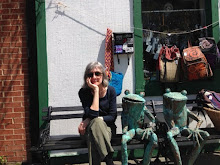Once a month, I visit a group of elders at a nursing home. We sing some Shabbat songs (whether they’re Jewish or not, they all love it), catch up with one another, and then I usually raise a question for discussion.
This summer, I asked them the question I was asking myself: What is love?
Before I tell you their answers, let me ask you.
Think for a moment, and fill in the blank:
What is love? Love is…
Here is what my elder friends at Wingate told me:
Love is…
...putting up with a lot
...caring
...helping
...allowing each other to be your own person
...when everything you do is for the other person
...accepting everything.
There is much wisdom in these few words.
And notice that their answers are remarkably devoid of any notions of “romantic” love.
The challenge underlying all my holiday sermons this year is to “Love More.”
Hard to argue with that, right? Who doesn’t want to love more?
But we don’t even necessarily agree about what love is.
Part of the difficulty is that the one English word love is used to refer to many different experiences. The Greeks understood long ago that we need more than one word for love -- they had three. Psychologists and philosophers have added even more.
There is “romantic” love.
There is a parent’s love of a child.
What other kinds of love are there, in your experience?
In Jewish tradition, there are many stories of love. Little known fact: The Song of Songs in the bible is one long, juicy love poem.
But the biblical model of love most admired by the early rabbis was the love of Jonathan and David. Jonathan, son of King Saul. David, who was to become King David.
Jonathan and David were best friends when they were young men.
The rabbis saw in their relationship a love that was not selfish.
A love that was not based on any conditions.
A love that wanted only to serve the needs of the other person.
A love that included self-sacrifice.
A love that transcended death.
We can imagine that this was the sort of love that the early rabbis themselves aspired to, building the emotionally close relationships with one another that at least some of them found more compelling than their arranged marriages.
So that’s the rabbinic exemplar of a loving relationship.
I’d like to invite you now to take a few minutes for quiet self-reflection as I ask you to consider a few questions:
Bring to mind one person who you love.
Now, when you say you love them, what does that mean?
Try to think of a few words that would define your love, or describe it.
You can also try saying what it isn’t, if that’s easier.
OR you can bring to mind someone in your life who has loved you -- how would you describe their love for you?
Thank you all for your willingness to open your hearts to share with one another.
As we enter into the new year, may we all be blessed to experience the healing power of love in our lives.
